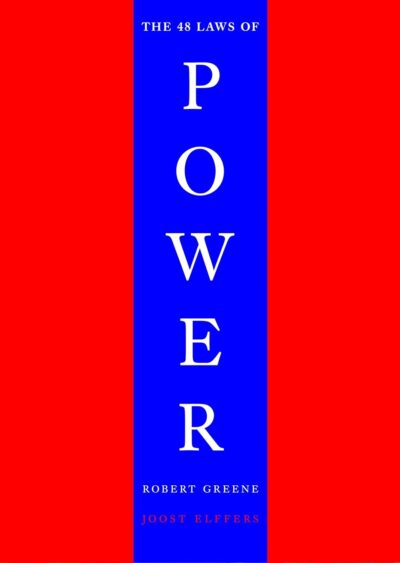63 Results with the "Non-fiction" genre
Adventure Fiction (709)
Biography (409)
Business & Finance (1)
Children's Literature (116)
Comics (6)
Culture (51)
Drama (28)
Dystopian (16)
Fable (86)
Fantasy (663)
Fantasy (63)
Fiction (723)
Finance (16)
Gothic Fiction (12)
Historical Fiction (455)
History (122)
Horror (55)
Lifestyle (36)
Literary (404)
Literary Fiction (167)
Memoir (157)
Mystery (333)
Novel (538)
Paranormal Fiction (96)
Philosophical (161)
Philosophy (45)
Poetry (249)
Political Fiction (11)
Politics (39)
Practical (32)
Psychological Thriller (107)
Relationship (5)
Romance Novel (503)
Romantic Melodrama (14)
Satire (62)
Science (55)
Science Fiction (238)
Self-help (64)
Society (64)
Society (2)
Spiritual Growth (1)
story (2)
Thriller (675)
True Crime (53)
view (11)
Women's Fiction (1)
Young Adult (31)
-
Chapter
LAW 18: The Dangers of Isolation
 Law 18 of The 48 Laws of Power warns against the dangers of isolation, arguing that retreating into seclusion for self-protection can lead to vulnerability and loss of influence. While it may seem that isolating oneself creates safety, it often disconnects a person from critical information, relationships, and the pulse of the world, leaving them exposed to unseen threats. Power thrives in networks and connections, and cutting oneself off can turn even a strong position into a fragile one. The story of…
Law 18 of The 48 Laws of Power warns against the dangers of isolation, arguing that retreating into seclusion for self-protection can lead to vulnerability and loss of influence. While it may seem that isolating oneself creates safety, it often disconnects a person from critical information, relationships, and the pulse of the world, leaving them exposed to unseen threats. Power thrives in networks and connections, and cutting oneself off can turn even a strong position into a fragile one. The story of…-
215.9 K • Ongoing
-
-
 Law 17 of The 48 Laws of Power emphasizes the power of unpredictability in maintaining control over others and keeping them in a constant state of uncertainty. Human nature thrives on predictability, as it provides a sense of security and the ability to anticipate outcomes. By breaking these expectations and acting in ways that defy logical patterns, one can create an atmosphere of unease, forcing opponents to second-guess their decisions and strategies. A striking example of this principle in action…
Law 17 of The 48 Laws of Power emphasizes the power of unpredictability in maintaining control over others and keeping them in a constant state of uncertainty. Human nature thrives on predictability, as it provides a sense of security and the ability to anticipate outcomes. By breaking these expectations and acting in ways that defy logical patterns, one can create an atmosphere of unease, forcing opponents to second-guess their decisions and strategies. A striking example of this principle in action…-
215.9 K • Ongoing
-
-
 Law 16 of The 48 Laws of Power highlights the strategic advantage of making oneself scarce to enhance influence, respect, and desirability. Human nature is such that people often take for granted what is constantly available, while they are drawn to what is rare or elusive. By mastering the art of withdrawal at the right moments, individuals can create an aura of mystery that amplifies their value and keeps others longing for their return. A classic example of this principle is Greta Garbo, the…
Law 16 of The 48 Laws of Power highlights the strategic advantage of making oneself scarce to enhance influence, respect, and desirability. Human nature is such that people often take for granted what is constantly available, while they are drawn to what is rare or elusive. By mastering the art of withdrawal at the right moments, individuals can create an aura of mystery that amplifies their value and keeps others longing for their return. A classic example of this principle is Greta Garbo, the…-
215.9 K • Ongoing
-
-
 Law 14 of The 48 Laws of Power highlights the importance of gathering intelligence while maintaining the illusion of trust, making information a crucial asset in securing dominance. Those who master the art of subtle espionage can anticipate threats, manipulate circumstances to their advantage, and ensure that they remain in control. By positioning oneself as a friend while quietly extracting valuable insights, one can use knowledge as a tool for influence and strategy. A compelling…
Law 14 of The 48 Laws of Power highlights the importance of gathering intelligence while maintaining the illusion of trust, making information a crucial asset in securing dominance. Those who master the art of subtle espionage can anticipate threats, manipulate circumstances to their advantage, and ensure that they remain in control. By positioning oneself as a friend while quietly extracting valuable insights, one can use knowledge as a tool for influence and strategy. A compelling…-
215.9 K • Ongoing
-
-
Chapter
LAW 13: When Asking for Help, Appeal to People’s Self-interest, Never to Their Mercy or Gratitude
 Law 13 of The 48 Laws of Power teaches a fundamental lesson: when seeking help, appeal to people's self-interest rather than their mercy or gratitude. Human nature drives individuals to prioritize their own benefit over goodwill or past favors, making a strategic appeal to self-gain far more effective than relying on emotional pleas. This law emphasizes the need to understand and exploit the motivations of others to secure their assistance, turning every request into a mutually advantageous…
Law 13 of The 48 Laws of Power teaches a fundamental lesson: when seeking help, appeal to people's self-interest rather than their mercy or gratitude. Human nature drives individuals to prioritize their own benefit over goodwill or past favors, making a strategic appeal to self-gain far more effective than relying on emotional pleas. This law emphasizes the need to understand and exploit the motivations of others to secure their assistance, turning every request into a mutually advantageous…-
215.9 K • Ongoing
-
-
 Law 12 of The 48 Laws of Power explores how selective honesty and well-timed generosity can be powerful tools for gaining influence and controlling outcomes. People are naturally suspicious of manipulation, but an occasional act of honesty or selflessness can lower their defenses, making them more susceptible to future persuasion. By strategically offering something of value—whether material or emotional—one can create an illusion of sincerity, leading others to trust and depend on them. A striking…
Law 12 of The 48 Laws of Power explores how selective honesty and well-timed generosity can be powerful tools for gaining influence and controlling outcomes. People are naturally suspicious of manipulation, but an occasional act of honesty or selflessness can lower their defenses, making them more susceptible to future persuasion. By strategically offering something of value—whether material or emotional—one can create an illusion of sincerity, leading others to trust and depend on them. A striking…-
215.9 K • Ongoing
-
-
 Law 11 of The 48 Laws of Power emphasizes the power of becoming indispensable, asserting that true influence lies in making others dependent on you for their success, stability, or happiness. When people rely on you for their progress, your position becomes secure, and your influence grows. This principle applies across personal, professional, and political relationships, where dependence ensures both leverage and control. An illustrative example from history is the plight of mercenaries in Renaissance…
Law 11 of The 48 Laws of Power emphasizes the power of becoming indispensable, asserting that true influence lies in making others dependent on you for their success, stability, or happiness. When people rely on you for their progress, your position becomes secure, and your influence grows. This principle applies across personal, professional, and political relationships, where dependence ensures both leverage and control. An illustrative example from history is the plight of mercenaries in Renaissance…-
215.9 K • Ongoing
-
-
 Law 10 of The 48 Laws of Power warns against the dangers of associating with individuals who are chronically unlucky or consumed by negativity. Misfortune and unhappiness often spread like a contagion, affecting those who remain in close proximity to such individuals. Rather than trying to rescue or reform them, it is wiser to distance oneself and instead align with those who bring value, optimism, and stability. A striking example of this law in action is the story of Lola Montez, a 19th-century…
Law 10 of The 48 Laws of Power warns against the dangers of associating with individuals who are chronically unlucky or consumed by negativity. Misfortune and unhappiness often spread like a contagion, affecting those who remain in close proximity to such individuals. Rather than trying to rescue or reform them, it is wiser to distance oneself and instead align with those who bring value, optimism, and stability. A striking example of this law in action is the story of Lola Montez, a 19th-century…-
215.9 K • Ongoing
-
-
Chapter
LAW 1: Never Outshine The Master
 LAW 1, Never Outshine the Master, is a foundational principle for those seeking to navigate hierarchical structures without provoking resentment. It warns that drawing too much attention to one’s talents can create unintended rivalry with those in power. Success should always be measured and carefully displayed, ensuring that superiors feel secure in their authority rather than threatened by a subordinate’s potential. Understanding LAW 1 allows individuals to maintain professional harmony while…
LAW 1, Never Outshine the Master, is a foundational principle for those seeking to navigate hierarchical structures without provoking resentment. It warns that drawing too much attention to one’s talents can create unintended rivalry with those in power. Success should always be measured and carefully displayed, ensuring that superiors feel secure in their authority rather than threatened by a subordinate’s potential. Understanding LAW 1 allows individuals to maintain professional harmony while…-
215.9 K • Ongoing
-
- Previous 1 … 4 5 6 7 Next

